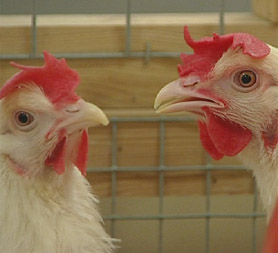GM chickens designed to ‘halt bird flu spread’
Scientists in Edinburgh and Cambridge create genetically modified (GM) chickens that cannot pass on avian flu to other birds, as Stuart McTeer writes.

The new research, published in the journal Science, revealed that scientists had introduced a modified gene that mimics part of the bird flu virus, to prevent its ability to replicate.
The chickens can still catch the H5N1 strain of influenza, but are unable to pass it on to other birds they come into contact with.
Avian flu is usually found in wild birds, but can spread quickly through entire flocks of poultry.
Scientists warn the H5N1 strain has jumped species, with the risk it could adapt to create a new virus epidemic among humans.
“We hope that it would stop the high load of bird flu that you get when a whole flock is infected and therefore reduce the opportunity for it to be passed onto humans.” Prof Helen Sang, Roslin Institute
Professor Helen Sang, of The Roslin Institute in Edinburgh, said she believed new GM chickens could eventually halt the disease’s spread.
“We hope that it would stop the high load of bird flu that you get when a whole flock is infected and therefore reduce the opportunity for it to be passed onto humans,” she said.
“If the genetic modification is shown to work it could then be introduced into the breeding schemes of poultry breeders and that would then be used in the breeding of poultry chickens.”
Food fears
The researchers acknowledged that there would need to be a much bigger study of their genetic modification in the chickens before it would be used in birds bred to be eaten.
But Dr Laurence Tiley, of the University of Cambridge, said he believed the changes would prove to be safe.
“We know what the nature of the genetical modification is that we’ve made – and certainly from our understanding of what that molecule is I think it is extremely unlikely that it would pose any risk either to the birds that contain it, which are completely healthy birds,” he said.
“Eating meat from those birds containing this particular transgene, there’s no reason to expect it would be harmful. But clearly we would need to go through the necessary regulatory approval before you could contemplate doing that.”
Cost concerns
Cost could prove to be a problem for any widespread introduction of GM chickens.
Analysts say the supply of broiler and egg-laying birds is largely controlled by a relatively small number of companies, so they could easily be sold to farmers worldwide.
However, many chickens are part of much smaller flocks owned by people in developing world countries, where avian flu has proved tougher to control.
Earlier this month, more than 100,000 infected birds were culled in South Korea after the country confirmed its first outbreak of the disease since 2008.
There have also been recent cases in Japan and Hong Kong.
The scientists behind the new research admit that many people in south east Asia would be unlikely to buy the more expensive bird with the modified gene.
“I think there is a question of whether poor farmers would afford it without additional support,” Professor Sang admits.
“But certainly I think commercially it could be introduced in commercial breeding companies. It could be introduced into their breeding strategy and would not be a huge cost.”
-
Latest news
-
FactCheck: Our analysis finds one in nine maternity services ‘double downgraded’ since 2022

-
FactCheck: Labour claims rail reforms would save taxpayer £2.2bn a year

-
‘Authentic Stupidity’: Ben Elton’s new show explores how idiotic human beings can be5m

-
Is Israel’s evacuation of Rafah the precursor to full scale invasion?3m

-
Eurovision: Non-binary artist wins for first time2m

-




